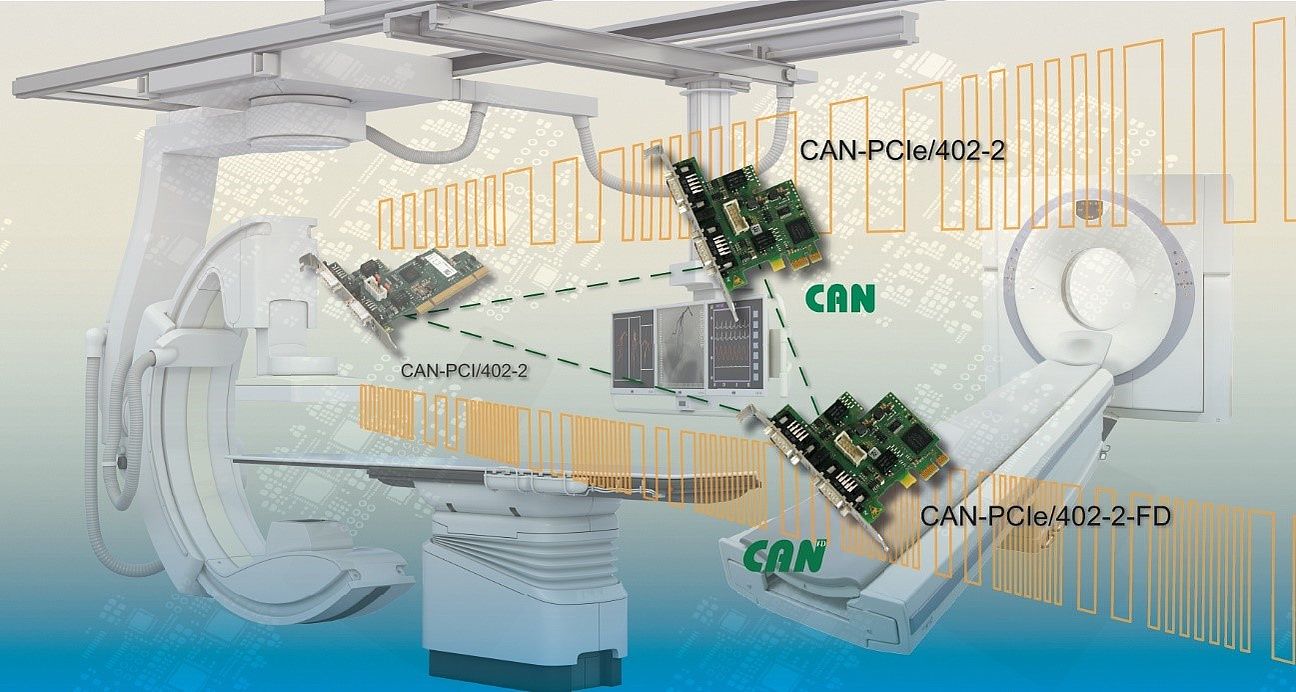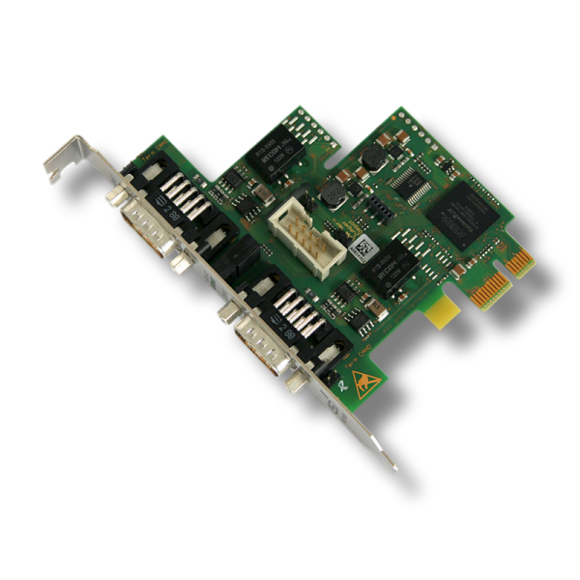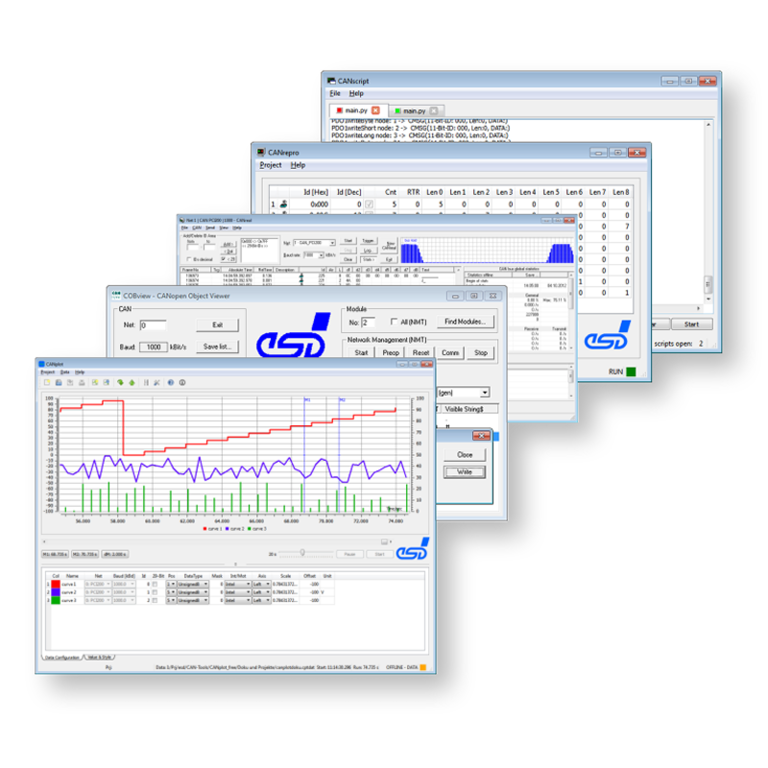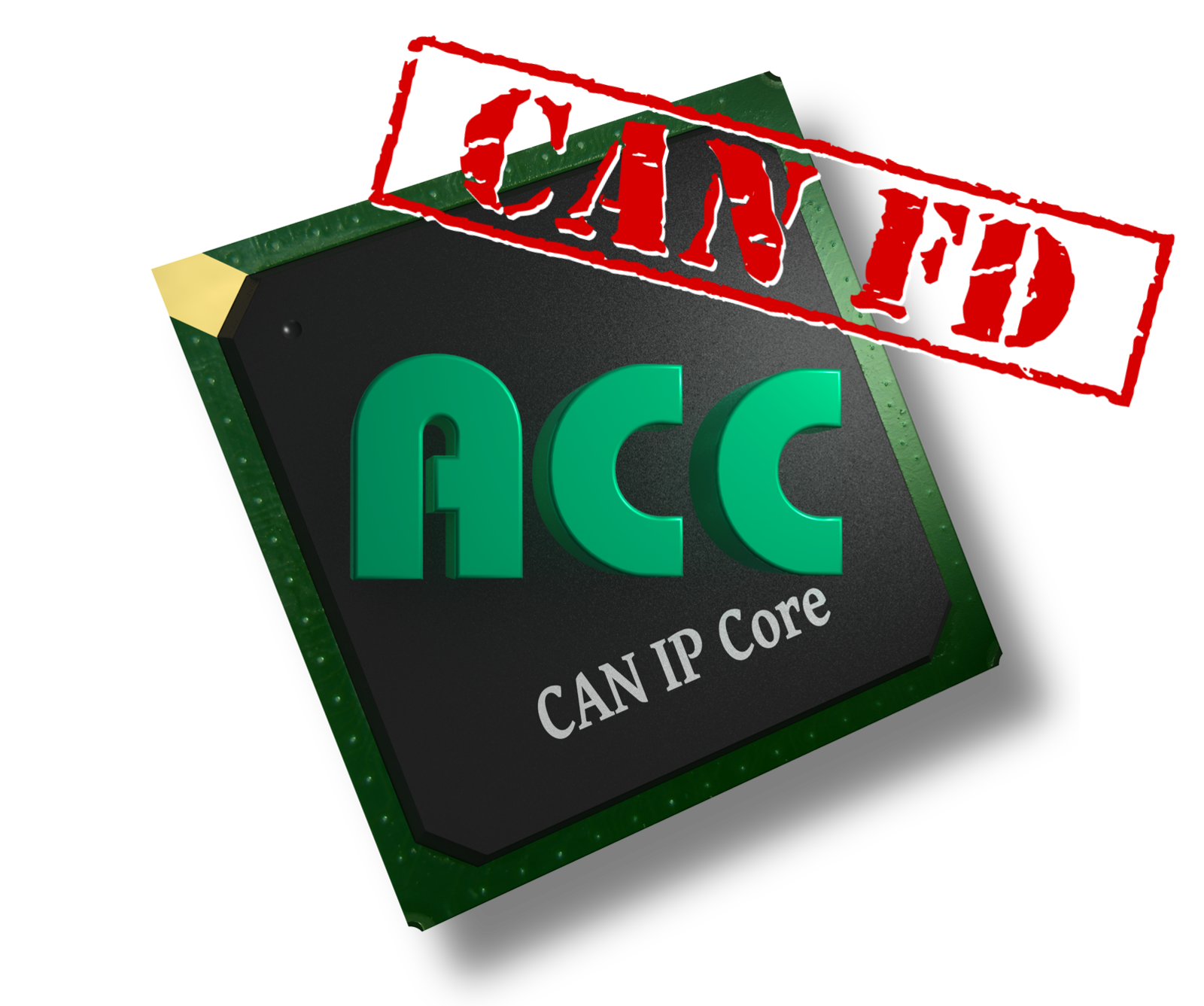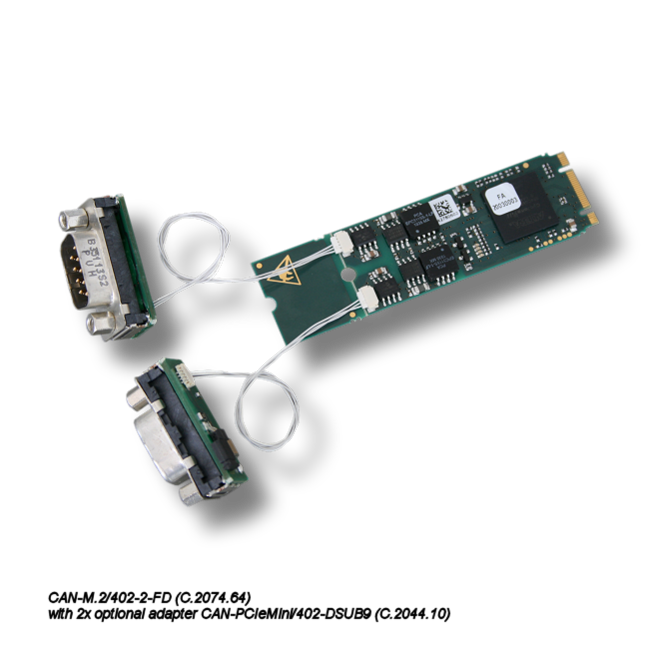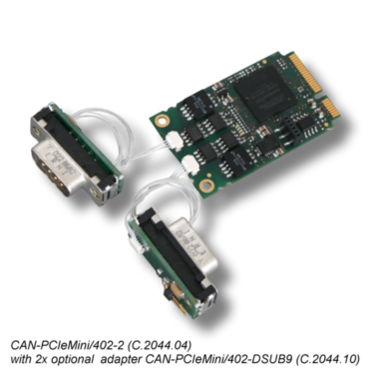CAN and CANopen – A proven Communication Standard in Medical Systems
The CAN and CANopen fieldbus have been used in medical technology for years now. Especially in imaging devices it is considered as a cost-effective communication bus. Boards with CAN interfaces can be found in control units of computed tomography, digital radiography as well as mammography screening or in devices of endoscopic surgery. Since the computer’s internal PCI bus is increasingly being replaced by the serial PCI Express bus, the provision of CAN boards with this kind of interface becomes necessary. The PCIe 402 series from esd electronics contains boards with up to four CAN interfaces according to ISO 11898-2.
For more than 25 years CAN and CANopen are used in medical systems and have been appreciated ever since as a secure and inexpensive communication standard. The benefits are clear: On the one hand the standardized communication makes it possible to build up a modular system of complex devices consisting of various components. On the other hand, the individual components can be configured centrally and supervised. In order to be able to communicate largely manufacturer-independently, the user organization CiA (CAN in Automation) has defined CAN profiles in working groups. They ensure a standardized communication according to CiA 312-4, 412-1, -2 and -6 as well as CiA 425-1 and -2, for example for laboratory automation or for medical devices. Thus, via the CAN profiles the process data to be transferred and the associated formats are determined.
Further Information for Download as PDF Document
-
CAN and CANopen – A proven Communication Standard in Medical Systems Full technical report on CAN and CANopen - A proven Communication Standard (PDF) 3 MB
Serial and Fast – PCI Express
Some computers with the PCI Express bus (PCIe) came onto the market as early as 2004. Since then, the standard has been continuously developed. PCI Express, unlike PCI, is not a parallel bus, but a serial, fully duplex-capable point-to-point connection and offers a higher data transfer rate per pin. The bus is neither electrically nor mechanically compatible with the PCI bus or with the graphic card’s interface AGP. That is why more modern control computers with PCIe bus justify the need for CAN communication using PCIe boards. As a pioneer in CAN, esd electronics is specialized on the development of components aimed at integrating fieldbus systems such as CAN (CANopen, CAN FD). Besides the tried-and-tested series with the form factors PCI, PMC, XMC and USB there is also the CAN-PCIe/402 series of various CAN-PCIe boards.
Variants for many Applications
With the CAN-PCIe/402 series developers and manufacturers of medical systems can resort to CAN boards with varying performance characteristics. They are used in a variety of ways, for example in engine controls of computer tomographs or for controlling the pumps of dialysis machines. The series includes boards with one, two or four active CAN Interfaces, 3.3 V1 according to ISO11898-2, and optionally boards with or without electric isolation. Transfer rates are between 10 kbit/s and 1 Mbps. All CAN boards of this series use the IP-CAN-Controller esdACC (esdAdvanced CAN Controller) implemented in the Altera FPGA and thus allow additional diagnoses as well as higher performance, even in the case of more than one port. The Single Lane PCIe Interface is designed in accordance with the PCI Express Specification R1.0a.
The board CAN-PCIe/402-4/2 Slot is equipped with four CAN interfaces laid out on two single slots. They are connected to the front via four DSUB9 adapters. The version CAN-PCIe402-B4/1Slot, though, requires only one slot. All four CAN interfaces are accessible in the front via a 37-pin DSUB connector. This variant is also available as low-profile version with one or two CAN interfaces. (CAN-PCIe/402-1-LP and -LP2). If there is need for only one or two CAN ports the CAN-PCIe/402-1 or CAN-PCIe/402-2 can be used. In case of applications with less space available a CAN board with PCIeMini equipped with two CAN interfaces might be a solution or the CAN-USB/400 module with one CAN interface.
Tools and Drivers simplify Handling
In order to be able to use the CAN boards under different operating systems (OS) such as Windows, Linux or the real-time OS QNX and VxWorks, corresponding drivers with uniform API and BSPs are available. This means that the API remains the same even when switching to a different operating system or CAN board. The higher layer CANopen protocol can also be used via existing protocol libraries. The boards support the CAN layer 2 programming interface (NTCAN API).
With all esd products, free tools facilitate development, commissioning and troubleshooting even in complex CAN networks. Five programs are available for this purpose: CANreal, the monitor program for monitoring and testing CAN networks, CANplot for graphical display of CAN data, and CANrepro for reproducing recorded CAN frames. Furthermore CANskript, a Python-based scripting tool and finally COBview for analysis and diagnosis of CANopen nodes. The tools run on all esd PC CAN interfaces (e.g. PCIe, USB, EtherCAN) and are suitable for all common Windows operating systems (32- and 64-bit). All five tools are part of the CAN SDK software development kit for esd's NTCAN API.
Powerful Data Management
By using the FPGA based CAN controller esdACC the boards support bus mastering and can initiate the writing of cycles to the host CPU RAM, all this independent of the CPU or the system’s DMA controller. This reduces the host CPU load and overall latency. Moreover, with the help of error injection additional diagnoses are possible. The DMA functionality (first party DMA) ensures higher performance even for several channels. Using MSI (Message Signaled Interrupts) the boards are ideal for applications in hypervisor environments. In addition, they support high-resolution time stamping (64 bit wide).
Data Rate Reserves
In some applications CAN reaches its limits due to low data rates. This is where CAN FD (Flexible Data Rate) offers an alternative. Components with CAN FD can handle transmission rates of up to 10 Mbit/s and user data of 64 bytes. Since these modules also operate on the classic CAN protocol, they can be used in classic CAN projects and converted to CAN FD at a later time. For instance, it is conceivable that a solution for laboratory automation is equipped with CAN FD components communicating with classic CAN. Later on, if data volumes rise, the project can switch to CAN FD without any major changes in infrastructure. With these reserves in the back the realization of future-proof projects becomes possible without having to shift to the more expensive Industrial Ethernet.
Focusing on Customer Needs
For many CAN applications the standard components offered by esd electronics are completely sufficient. If, however, automation projects with quite specific customer needs are to be realized, this calls for an external service provider contributing the necessary knowledge and expert experience. esd electronics looks back on more than 35 years of experience in the field of industrial automation with a focus on the development and production of bus components and control units. With this know-how the expert teams are able to realize automation projects according to customer requirements in a best possible way. Even though many companies rely on their own development teams, limiting time and staff resources can make the awarding of development contracts attractive. In this way the intended development goals will be accomplished and the automation project can be completed on time.
Feel free to sign up for our newsletter and stay up to date. Click here to register

